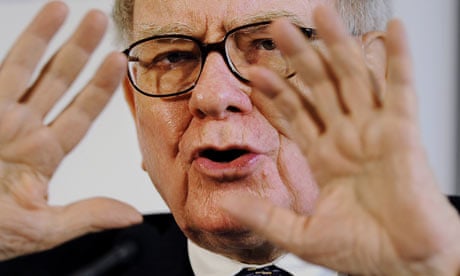Warren Buffett, the US investor dubbed the Sage of Omaha, has lost hundreds of millions of dollars on investments in two Irish banks, he admitted at the weekend, as his Berkshire Hathaway group turned in its worst year on record.
In his annual letter to shareholders Buffett said he had done "some dumb things" as Berkshire's annual income fell 59% and its net worth dropped by $11.5bn (£8bn) in 2008. They included a near-$3bn loss after he bought a stake in ConocoPhillips when the crude price was at its peak and made a smaller but not insignificant bet on the banks.
"During 2008, I spent $244m for shares of two Irish banks that appeared cheap to me," he said. "At year end we wrote these holdings down to market: $27m, for an 89% loss. Since then, the two stocks have declined even further. The tennis crowd would call my mistakes 'unforced errors'."
Ireland's financial system has been caught up in the global credit crunch, with the country being the first in the eurozone to enter recession. Although Buffett did not name the Irish banks concerned, the two top lenders are Bank of Ireland and Allied Irish Banks, both of which have needed support from the country's government. The third-largest lender, Anglo Irish Bank, has been nationalised and its offices were recently searched by fraud investigators.
On the Conoco purchase Buffett said: "I in no way anticipated the dramatic fall in energy prices that occurred in the last half of the year. I still believe the odds are good that oil sells far higher in the future than the current $40-$50 price. But so far I have been dead wrong. Even if prices should rise, moreover, the terrible timing of my purchase has cost Berkshire several billion dollars."
Among Buffett's other investments is a 2.9% stake in Tesco, where he was sitting on a $133m loss at the end of December.
"Investors of all stripes were bloodied and confused, much as if they were small birds that had strayed into a badminton game," Buffett wrote. He put the blame for the market turmoil squarely on the housing market bubble. "Lenders happily made loans that borrowers couldn't repay out of their incomes, and borrowers just as happily signed up to meet those payments. Both parties counted on 'house-price appreciation' to make this otherwise impossible arrangement work. It was Scarlett O'Hara all over again: 'I'll think about it tomorrow.' The consequences of this behaviour are now reverberating through every corner of our economy."
He warned that he saw little sign of an improvement in the global economy this year, though the continuing recession would not necessarily mean the stockmarket would continue to fall. In 75% of the past 44 years the S&P index had risen and Buffett said he believed a similar percentage of years would be positive in the next 44.
"We're certain that the economy will be in shambles throughout 2009 – and, for that matter, probably well beyond," he said. "But that conclusion does not tell us whether the stockmarket will rise or fall."
As well as suffering losses on Conoco and some of its other listed investments, Berkshire Hathaway's industrial businesses were hit by the effects of the credit crunch and the recession.
Berkshire's net income dropped 59% in 2008 from $13.2bn to $4.99bn. The fall accelerated during the fourth quarter, with income down 96% to $117m.
"Most of the Berkshire businesses whose results are significantly affected by the economy earned below their potential last year, and that will be true in 2009 as well," Buffett said. "Our retailers were hit particularly hard, as were our operations tied to residential construction."
Buffett – who five years ago called derivatives "financial weapons of mass destruction" – repeated his warning that they were dangerous but admitted Berkshire was a party to 251 such contracts. He said the reason was that they were mispriced at the time they were taken out. "I both initiated these positions and monitor them. If we lose money on our derivatives, it will be my fault."
